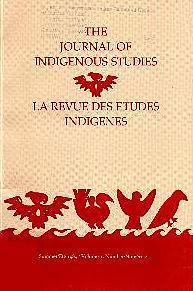Journal of Indigenous Studies facts for kids
 |
|
|
Abbreviated title (ISO 4)
|
J. Indig. Stud. |
|---|---|
| Discipline | Anthropology |
| Language | English, French, Cree |
| Edited by | Dana F. Lawrence (1989–1990), Catherine Littlejohn (1991), Karla Jessen Williamson (1996–1997) |
| Publication details | |
| Publisher |
Gabriel Dumont Institute of Native Studies and Applied Research (Canada)
|
|
Publication history
|
1989–1997 |
| Frequency | Biannual |
| Indexing | |
| ISSN | 0838-4711 |
| OCLC no. | 19758199 |
The Journal of Indigenous Studies (in French: La Revue des Études Indigènes) was a special magazine, also known as an academic journal. It was published twice a year and featured articles checked by other experts (this is called peer-reviewed). The journal focused on Indigenous cultures and topics.
It started in 1989 and was supported by the Gabriel Dumont Institute. This institute is a Métis-led group in Saskatoon, Saskatchewan, Canada, connected to the University of Regina. The journal covered many different subjects, like archaeology, education, law, linguistics, philosophy, and sociology. It looked at Indigenous topics from many angles.
The journal was unique because it was multilingual. All six volumes were written in English and French. Three of these volumes (Numbers 3, 5, and 6) also included articles in the Cree language. The last issue of the journal came out in 1997.
Contents
History of the Journal
The Journal of Indigenous Studies had a few different editors during its time. Dana F. Lawrence was the first editor who helped start the journal.
Early Years (1989)
The very first issue came out in January 1989. It was available in countries like Australia, Canada, the United Kingdom, and the United States. This issue discussed topics like native self-government and Indigenous values in education. It also looked at language programs for Indigenous and Métis people. The issue also included reviews of two books.
The second issue was published in July 1989. It featured articles about Aboriginal languages, including the Michif language. It also had articles about First Nations women. This issue also contained three book reviews.
Changes in the 1990s
No issues were printed in 1990 because of changes in staff. Dana Lawrence moved to the University of British Columbia. Catherine Littlejohn, a historian and writer, became the new editor for the third issue. This issue was published in January 1991. Like the first editor, Littlejohn wanted people from all over the world to contribute. This issue was special because it was written in English, French, and Cree. It included articles on archaeology, health, and spirituality, plus two book reviews.
The fourth issue, released in July 1991, brought some big changes. The journal created a new review board made up of experts from Canadian institutions. Summaries of articles (called abstracts) were now written in Cree syllabics. Also, the journal became more flexible about how articles were formatted. It also made sure that information from traditional Indigenous knowledge was properly checked by the community. This issue covered topics like education, law, and residential schools. It also had two book reviews.
The fifth issue came out in January 1992. The editor, Catherine Littlejohn, had left the journal. This issue expanded its reach to New Zealand. It included articles on the Māori language and Māori music. There was also a story about Paula Gunn Allen, a Native American poet. This issue had one book review.
The sixth and final issue of the journal was published much later, in January 1997. Karla Jessen Williamson became the new editor for this last issue. The list of people who helped review articles was also updated. This issue focused on education, jobs, and how Indigenous people and newcomers interacted. It also featured articles about Indigenous Australians and North American Inuit people. This final issue included three book reviews.
How it Was Published
The front cover of the journal was designed by Sherry Farrell Racette. While the colors of the cover changed for different issues, the design itself always stayed the same.
The early issues of the journal were prepared for printing (this is called typeset) by ABCOM Publishers. The very last issue was typeset by The Little Print Shop in Saskatoon. Most of the issues were printed and sent out by the University of Toronto Press. The journal did not accept money for advertising in its pages.
See also
- American Indian Quarterly
- Indigenous Law Centre
- Journal of Aboriginal Health
- Oceania
- Native American studies
- Center for World Indigenous Studies
- Society for the Study of the Indigenous Languages of the Americas
 | May Edward Chinn |
 | Rebecca Cole |
 | Alexa Canady |
 | Dorothy Lavinia Brown |

